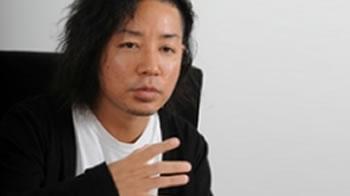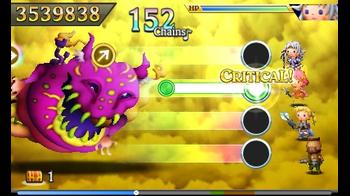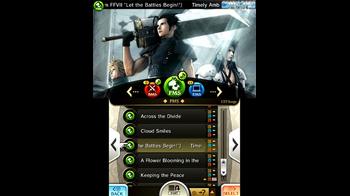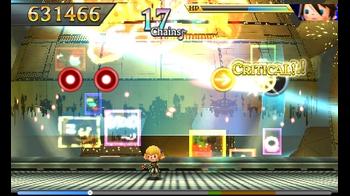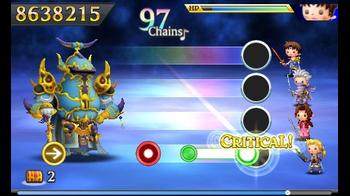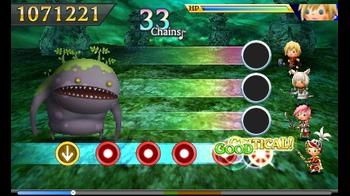
Musical Magic: A chat with Theatrhythm Final Fantasy's Creator
"The music of Final Fantasy has been really successful," Square Enix's Ichiro Hazama enthuses to me. "It's got a great following around the world - you see the concerts everywhere, the soundtrack releases... That's why I think this music works quite well as a basis for a game in any market."
Hazama, producer on the Theatrhythm Final Fantasy titles, is explaining to me why he feels his strange little music-based, screen-tapping spin-off was not only successful in Japan, but in foreign markets also. At the time of our conversation, he's in the midst of preparing a Western release for that game's sequel, subtitled Curtain Call.
What he says about the music of Final Fantasy is right, too: While the Super Mario Bros. theme or even the annoyingly catchy Angry Birds tune might be more widely recognizable, Final Fantasy is arguably the video game series with the most musical prestige.
Taking a franchise largely focused around deliberately selecting actions from a menu, and marrying it to the action and reflex-based rhythm genre is a strange and difficult task indeed. It's there we begin when Hazama begins to talk through the creation of Theatrhythm.
"Rhythm games are, of course, quite an established genre," he explains. "In my view, rhythm games in the traditional sense are something that can be quite difficult to get into - there's a very high bar from the start. People who are very good at them really like them, but it's quite hard for first-time players to get into them."
The solution for his team, Hazama reveals, was to leverage one of the most recognizable layers of the Final Fantasy ethos - traditional Role Playing Game mechanics.
"What we tried to do in Theatrhythm is use the RPG elements to soften that difficulty," he continues. "By having you train up your characters, increasing their hit points or learning abilities that allow you to recover hit points, it makes it easier to play through some of the more difficult stages - you can get to the end of them even if your skill level and sense of rhythm isn't as developed, but there's still challenging for a perfect run or for the high score for skilled players."
"That's one of the very important reasons we feel the RPG elements are needed in the game. It also adds flavor to help it feel like a 'real' Final Fantasy."
While there's a vague hope that the game might attract different audiences, he and his team are under no illusion. Theatrhythm Final Fantasy: Curtain Call is, like its predecessor, all about fan service.
"First and foremost, we feel we really have to serve the existing Final Fantasy fans. One hundred percent - there's no doubt about that. It's very much for existing Final Fantasy fans," he emphasizes.
Beyond RPG elements, Final Fantasy is arguably next most closely associated with its stories. Theatrhythm, however, can live just fine without it, "There wasn't any temptation there," Hazama makes plain. "If we just put in a story that wasn't fully thought out, that was a bit half-baked... that would be unforgivable for the series."
"I felt that wasn't a major point for this game. We wanted to capture the elements of Final Fantasy outside the story that made the series what it is - the visuals, the feel, and especially the music."
Hazama actually goes on to argue that he thinks the finished product - which has been out in Japan for a little while now - could in his eyes survive with even less story.
"The PR guys and the development company did feel that people wouldn't understand what's going on if we didn't have it, though - so there was a bit of collaboration and compromise going on there, and that's how we got to where we are," he grins.
Being dedicated to fan service and steering clear of any timeline-bending universe-crossing story action, unlike Dissidia, has helped the team to maintain focus on what's important for Theatrhythm, then - the music. Even so, the process of picking what tracks to feature in the title's 200-plus strong suite of music wasn't easy.
"Everybody has their one favorite title," Hazama says. "Personally I like FF6 the most. FF7 is the one that's really, like, a show title... it has a huge following. Everybody wants to find the bit of Final Fantasy they like best represented in the game."
"To do that, we basically thought that even though we have to make a final decision on what tracks go in there, we should not make the whole decision-making process ourselves. We took a bunch of surveys - we did some ourselves, and we looked at ones the fans had created themselves, too. We referred to those a lot, and used that to help inform us on which tracks would go in the game, mixing that with the goal of trying to get a broad range of music from across the series."
"As this is a representation of the whole Final Fantasy series, it really needs to have all of the famous tunes, even the less-known ones. For instance, from FF9, Hunters Chance - if that was missing, I'm not sure it'd feel like a complete collection."
Beyond the impressive selection of tracks that'll ship on the cartridge, Theatrhythm: Curtain Call will be supported by a consistent flow of DLC that Hazama hopes will continue for some time. "There's no fixed point at which we plan to stop," he notes. "I'd personally like to continue for quite a long time and put out quite a lot of stuff."
And what of traveling beyond the parameters already set within the game? I'm something of a fan of some of the outlandish remix and rearrangement CDs Square Enix put out, for instance, and there's always new FF titles on the horizon.
"I think as we release new FF titles, there's a very high chance that people will want to enjoy rhythm games and music games with the songs from those. There's a very good chance of that stuff filtering through, but that's not finalized yet," Hazama chuckles.
"Anything that's got 'Final Fantasy' written on it and music in it, game or not, could be in there. It'd fit. To represent the whole series broadly and fairly, we did have to draw a certain limit about how far we would go. We could go to some of the remix albums with Downloadable Content, however - if in the future the fans would like that direction, it certainly isn't impossible."
"SaGa is perhaps one exception to the rule," Hazama adds after a thoughtful pause. "We put that in there as a little experiment. I personally thought it'd be quite interesting to see what the reaction people had to having that available was. It's a bit of an experiment."
Also strangely experimental at the time was Theatrhythm's art, a strangely cutesy, doll-like design that put every character on an equal footing. Having experienced the first game, it all looks rather normal now - but it wasn't always such an obvious choice.
"It was actually a very difficult decision to make," Hazama recalls. "One thing we considered was keeping the original styles - but if we went with the visual graphics for each of the Final Fantasy games - if each character looked as they did when they first appeared - you'd have 8-bit pixel graphics next to PlayStation polygons, and HD stuff... the mixture might not look so good."
"We wanted a style where we could draw everything together and make everything look consistent. We could've chosen to have a very modern, very realistic style for that, as was done with Dissidia, but I think for a rhythm game that is played reasonably casually, a more serious look might raise the barrier of entry a little bit for some players. It had to be something fun and accessible, like the game - and I feel this graphic style fits that."
Less experimental about Curtain Call is its choice of platform. After giving Theatrhythm a brief jaunt on mobile devices, Hazama's team is returning to familiar ground with a 3DS-only release - something which disappointed Vita owners looking for a reason to put that device's touch screen through its paces. Why choose 3DS - especially when its titular feature is barely used in the game?
"Well, because it's a rhythm game, 3D really isn't important to how the game plays," Hazama says. "As for the reason we went back to doing 3DS - it's mainly because the majority of the fans seemed to enjoy it on that platform the first time. When we thought about doing a sequel, we realized that we of course had to give it to the people who had supported us from the very start. They deserved to enjoy the sequel in the same way."
"It's true that all of the new, major HD Final Fantasy releases are released on the PlayStation platforms, so it does sort of make sense to factor that in. The reason we went with the 3DS for the first one is that we wanted it to be a game that could be enjoyed by all kinds of different people from all kinds of age groups. When you want a game like that, the 3DS is really the most suitable console to do that on."
"After we released the first game and we saw the results, we realized that we had a good customer base from the 3DS. Having that base there, it made sense to return and cater to them a second time."
There's likely another reason not mentioned by Hazama - the fact that in a sense much of the work for Curtain Call, which is arguably as much an expansion pack as a sequel, was already done. There's a lot of new content in the title, but the framework is still very much the same - something that was a deliberate choice on the part of the development team.
"Normally when you make a sequel to a game, you take something out in order to insert something new in. I'm really not a fan of that idea - it makes more sense to me to just keep adding more and more stuff in, to increase the volume."
This is the perfect place for Hazama to launch into an explanation of new features in the title, and he obliges without prompting. There's a ton of new music, each with three difficulty levels - "I'm quite embarrassed to say that I can't really play on the Ultimate level," Hazama says with a grimace. There is also a new quest mode and a versus mode, as well as three different ways to control the game - touch screen, buttons, and one-handed.
"I can imagine the scene now where a very hardcore player gets totally beaten by another player online - and then you see in the results screen he's using the one-handed style!" Hazama laughs. "He beat me one-handed! It's like something from a film."
When asked what's next, Hazama seems to explode with an excited energy. At first he mentions how he'd been talking about motion control in music-based games earlier in the day, but conversation quickly turns, instead, to the concept of Theatrhythm as a brand beyond the Final Fantasy series.
Could we see a Theatrhythm Kingdom Hearts, for instance? Hazama appears hopeful that the series can expand beyond Final Fantasy:
"It's Theatrhythm: Final Fantasy, not Final Fantasy: Theatrhythm - that's my thought on it. As the creator of the series, I'd very much like to see and develop future titles with the Theatrhythm brand title, changing the words 'Final Fantasy' for other brand titles."
"There's nothing concrete at the moment, but that's something I'd certainly like to do," Hazama grins.
Asked to explain what his dream concept for a Theatrhythm title would be, Hazama lets out a gleeful little laugh and shakes his head. "That's a very hard one to answer!"
After a slight pause, though, he has his answer, and seems furtive as he says it, as though the idea is so crazy it needs to be whispered.
"I think I'd like to do one with lots of different musical artists," he begins. "Think of some of your favorite bands - Japanese bands, Western bands, anything, really... And you pick your line-up from members of the bands... and you have them go out and play and battle monsters like in Theatrhythm to their music! I think that'd be great!"
A far cry from Final Fantasy characters using the power of music to fight some of their most famous enemies - but a pretty awesome idea nonetheless. Hopefully Hazama continues to have the opportunity to expand the Theatrhythm brand.
Theatrhythm Final Fantasy: Curtain Call releases in North America on September 16th, and Europe on September 19th. It's available for pre-order now.
